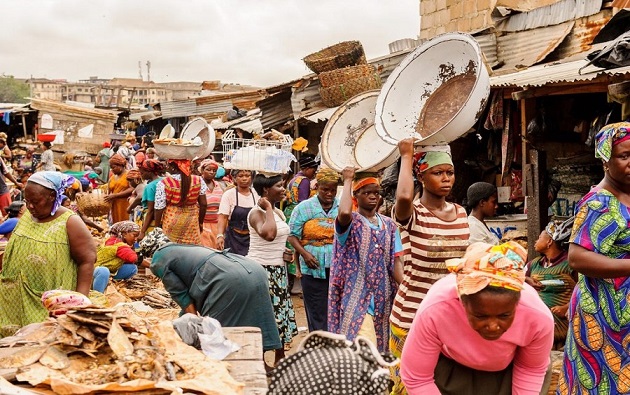Poverty is a lack of the basic resources and opportunities that are needed to live a safe, healthy, and productive life. It can be defined in terms of a lack of income, assets, and access to basic services like health care and education. It can also be defined in terms of vulnerability and exclusion, as people who are poor are more likely to experience violence, discrimination, and social isolation.
Before the arrival of European colonial powers, Nigeria was made up of a number of independent states, each with its own system of government and economy. These states varied in terms of their wealth and poverty levels. However, overall, most people lived in relative poverty, relying on subsistence farming and trade to survive. The arrival of the British in the 19th century led to a dramatic change in the economy and government of Nigeria. I’ll continue with that history.
After the British gained control of Nigeria, they established a new system of government and economy that was designed to benefit the British. This system led to widespread poverty and inequality, as the wealth of the country was largely concentrated in the hands of a few wealthy elites. The British also introduced new agricultural practices that led to a decline in traditional farming methods and an increase in poverty. By the time Nigeria gained independence in 1960, most of the population was living in extreme poverty. After independence, Nigeria faced many challenges, including a civil war and military rule. These challenges led to a further decline in the economy and an increase in poverty. In the 1970s and 1980s, the government attempted to address poverty through various development programs, but these programs were largely unsuccessful. Since the 1990s, the Nigerian economy has grown significantly, but poverty remains a major problem, with over half of the population living below the poverty line.
In recent years, Nigeria has made progress in addressing poverty, but it remains a major challenge. The government has implemented various programs and policies aimed at reducing poverty, but the effects have been mixed. One of the biggest challenges is the unequal distribution of wealth, with a small number of people controlling a large proportion of the country’s resources. Another challenge facing Nigeria is the high rate of unemployment, which is estimated to be around 23%. This high rate of unemployment contributes to the high level of poverty, as many people are unable to find work to support themselves and their families. In addition, the country faces a number of other challenges, including high levels of corruption and a lack of infrastructure. One of the major issues contributing to poverty in Nigeria is the country’s dependence on oil. The oil industry has brought wealth to some, but it has also led to environmental degradation and conflict in the oil-producing regions. The oil industry has also made the economy vulnerable to fluctuations in the global oil market.
In addition to the oil industry, another major issue contributing to poverty in Nigeria is the country’s high population growth rate. The population has grown rapidly in recent decades, putting pressure on the country’s resources and making it difficult to provide basic services like healthcare and education. This rapid population growth has also contributed to urbanization, with people moving to cities in search of work and a better life. Another factor contributing to poverty in Nigeria is the HIV/AIDS epidemic. The country has the second-highest number of people living with HIV/AIDS in the world, and this epidemic has had a devastating impact on the economy and the health of the population. Poverty has also been exacerbated by a number of other factors, including gender inequality, ethnic conflict, and religious violence.
Poverty has eaten so deep into Nigeria Economy and has birthed some unerasable negative effects that might take eternity to get off.
One of the major effects is poor health, with high rates of infant mortality, malnutrition, and preventable diseases. Poverty also leads to limited access to education, with many children unable to attend school. This lack of education perpetuates the cycle of poverty, making it difficult for people to escape from it. In addition, poverty leads to crime, with people resorting to illegal activities in order to survive. Poverty also has a negative impact on the environment, as people resort to activities like illegal logging and mining to make a living. This leads to deforestation and other forms of environmental degradation. Additionally, poverty leads to a lack of political and economic stability, which can lead to conflict and unrest. In short, poverty has many far-reaching effects on the lives of Nigerians, making it a major challenge for the country. Another aspect of poverty in Nigeria is its impact on women and girls. In many cases, women are responsible for caring for their families, but they often lack the resources and opportunities to improve their lives. This leads to a cycle of poverty and inequality that is difficult to break. In addition, girls are often forced to drop out of school early to help support their families, which limits their opportunities later in life. The situation is particularly difficult for widows, who often face discrimination and exclusion from their communities.
Nigeria our great country is falling gradually every day, the government are not helping, Youths are frustrated and discouraged, our culture are fading away, people losing hope in religion. Oh my country what has become of us!
What can we do to rise? Subsidy, inflation everywhere, cyber crimes everywhere causing dollar to inflate and has negative impact on the price of commodities sold here in Nigeria. Of course! One of the major consequences of poverty in Nigeria is its impact on human development. Poor nutrition and health care contribute to high rates of infant mortality, leading to lower life expectancy overall. In addition, there is a lack of access to clean water and sanitation, which leads to poor health and disease. This lack of development also leads to a lack of opportunity, with people unable to get good jobs or build successful businesses. Over time, this leads to a feeling of hopelessness and despair, which can have devastating effects on individuals and communities.
Another consequence of poverty in Nigeria is its impact on children. Many children are forced to work in order to support their families, which means they are unable to attend school and get an education. This has a major impact on their future prospects, as they are less likely to be able to get good jobs and break out of the cycle of poverty. In addition, many children are also forced into early marriage, which limits their opportunities and puts them at risk of health problems and abuse. I think it’s important to understand the full picture of poverty in Nigeria. Another consequence is the impact on the environment. As I mentioned before, poverty leads to deforestation and other forms of environmental degradation. In addition, it also leads to increased levels of pollution, as people use whatever materials they can find to build shelters and make a living. This has major consequences for the health of the population, as well as the future of the country.
These are what poverty has done in Everybody looking confused and has made people or created high rate of Emigration out of Nigeria. The most amazing part of this is that we can come out of this! When there is life, there is hope.
One solution is to increase access to education, so that children can get the skills they need to break out of the cycle of poverty. In addition, it’s important to improve access to health care and clean water, so that people can stay healthy and avoid disease. Another solution is to create more economic opportunities, so that people can get good jobs and support their families. Finally, it’s important to promote equality and fight discrimination, so that everyone has a chance to succeed. Another solution is to improve the agricultural sector in Nigeria, so that farmers can earn a decent living and support their families. This can be done by improving access to technology, seeds, and other resources, as well as by promoting sustainable farming practices.
Additionally, the government can provide support to small businesses and entrepreneurs, so that they can grow and create more jobs. Finally, it’s important to promote good governance and fight corruption, so that people’s needs are met and the country can move forward.
Another solution is to invest in infrastructure, like roads, bridges, and sanitation systems. This can help people to move around more easily and access the resources they need. It can also improve health and quality of life. Additionally, it’s important to invest in energy, so that people have access to electricity and can do things like run businesses and stay connected to the world.
If the Government can look into this, there is hope for Nigeria. Selfishness, corruption, backbiting should stop and we will have Nigeria a better place to stay.
– Akpata Tolulope Japhet
Prince Abubakar Audu University, Anyigba, Kogi state




